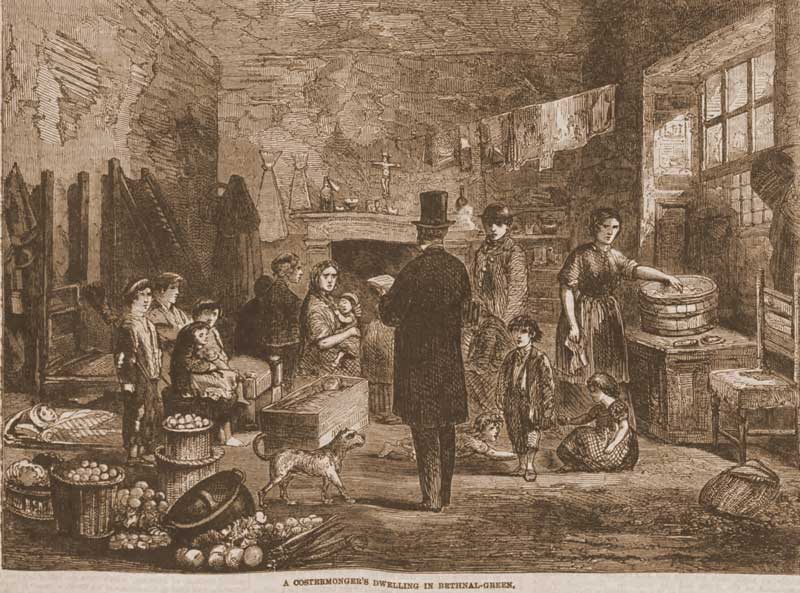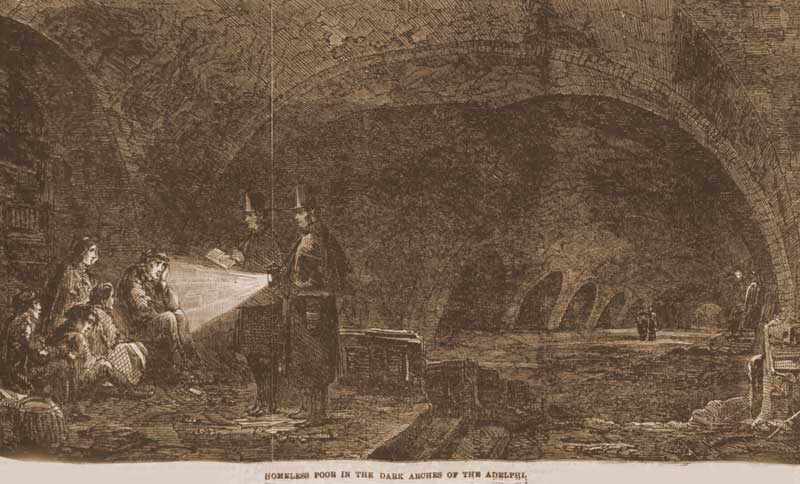Exploring the dwellings of the poor in both the East End and the West End of London was a recurrent theme with many Victorian newspaper reporters.
The accounts they have left us of their explorations of the hovels and resting places of the destitute residents of the metropolis makes for uncomfortable reading, separated as we are by the passage of many years.
On Saturday, 10th October, 1863, The Penny Illustrated Paper, published the following article which took its readers on a journey into the slums of the Victorian East End, before shining a light into the dark tunnels that snaked their way beneath the Adelphi, a knot of streets located, and still located, off Strand in west London.
The Article read:-
A FOUL ABODE IN BETHNAL GREEN
“The very first house we enter contains a few sights which actually shook the experienced officer, who has made his way in with the brief introduction, “All right; only come to see the state of the rooms.”
The narrow and uneven passage is thickly covered with dirt, which makes it difficult to tell whether we are really on boards or on the bare earth.
Straight before us is the yard, which is flooded with foul water, and which reeks with the most offensive odours.
We mount the broken stairs of the house, avoiding, as much as possible, contact with the filthy walls, on which whitewash, if it were ever to find its way there, would not know how to stop.
We rap at a door on the pitch dark landing.
THE DYING COUPLE
There is no answer, and so we knock again. Again no sound of life within; so we lift the latch and enter.
A man and woman lying ill, and, seemingly, near the time of merciful release, are the occupants of this chamber.
They are on a miserable bedstead covered with a few rags.
There is a fire, and the heat and stench of the room are not to be borne so suddenly after our quitting the fresher air of the street.
The man has been a labourer at the gasworks; his wife, in the last stage of decline, looks hardly more emaciated than he, and a skilful physician might have difficulty in saying which of them will go first.
The other rooms in the house are tenanted by thieves and prostitutes.
The occupations of the people are various, and sometimes difficult to claim; but we may specify mudlarks and persons who work in the sewers, coster-mongers, fish- curers, japanners, and a few weavers, with here and there a dock-labourer or two living in the more decent tenements.

FAMILIES LIVING IN ONE ROOM
House after house is entered by us, and not once do we hear of a family occupying more than one room.
The doubt whether two or three families may not, contrary to law, herd in one of those dens, is not satisfactorily solved by passing inquiries.
Presently, we pay a visit to a small and wretchedly bare apartment, in which are a man without his coat; a thin, haggard woman; and a little troop of children, one sitting on the sacking of the bedstead.
A PLAYER AT “LEADS”
The man’s violin is on a shelf in a comer of the room, and we find that he is a player at “leads.”
A “lead” is a benefit concert got up at a beer-shop, sometimes to help a brother or sister in trouble, and sometimes to raise a sum towards defraying funeral expenses.
The cards for distribution are very curious reading.
They usually commence with a sentiment to the effect that we ought all to help each other; and then they go on to announce, in all sorts of type and orthography, that a friendly lead will be held on such and such an evening, in such and such a place, for the benefit of so-and-so, otherwise Boiler, better known as Nuts, to assist him in burying his wife or child; or perhaps to bury Boiler himself.
THE SLEEPING UNFORTUNATE
In a back room on the basement of this house, we see a young “unfortunate” sleeping soundly – it is between two and three o’clock in the afternoon – and her pale, handsome face, with the hair cut close, looks like that of a boy of thirteen or fourteen.
This, at a guess, would be about her actual age.
NOBLE PHILANTHROPY
In New Nichol-street some of the houses were lately seized under the Building Act, and there have been a few reforms here about; though nothing that the public authorities have done can be named side by side with the noble philanthropy of Miss. Burdett Coutts, whose model lodging-houses have led the way for improvements which must be made, out of very shame.
This lady’s visitors, too, are active in smelling out the most necessitous of those panfuls deserving help.
A STRANGE COURSE OF ACTION
The Bethnal-green Board of Guardians is taking a strange course in reference to these disclosures.
At their meeting on Monday evening Dr. Moore, who has been mainly instrumental in bringing the causes of the mortality in the district under the notice of the Coroner, was severely rated for what he had done.
Instead of showing any signs of regret for the neglect of which they or their officers have been guilty, the guardian. resent the publication of the fact.
They endeavoured to show that things were not as bad as they had been represented.
It is clear, however, that they are bad enough, and the public has a right to expect that the complaints shall be treated in a different manner to that in which the authorities seem disposed to treat them.
THE DARK ARCHES
Still sadder scenes – scenes more suggestive of that utterly forlorn despair which is the supremist agony of life – may be witnessed in other parts of London.
This is known. No man dares to deny it. No man, not even the most brazen-faced and leather-lunged of parochial guardians, will dare to say that the condition of the very poor in this city is other than a horror and a shame – a scandal to our good repute – a foul blot upon our shield.
The subject of our Sketch is a portion of the immense dark arches which extend below the Adelphi buildings.

TATTERED AND PICTURESQUE GROUPS
Some time ago, we saw here tattered but picturesque groups, lighted by a dim fire, which would have formed good materials for the pencils of Salvator Rosa or Rembrandt.
On Sundays, large companies of young and old of both sexes used to assemble together, and gambling and other vices were practised in the dark shade with impunity, close to the bustling and well-regulated thoroughfare of the Strand.
The police now more actively do their duty; nevertheless, the houseless here at times find a lodging in some of the most secret nooks.
NOT ALL SELF-INFLICTED
Doubtless amongst the outcast population a considerable portion have brought the misery upon themselves by idleness, dishonesty, and intemperance; but there are in this class many who really deserve commiseration and assistance, who have not obtained admission into the casual wards of the workhouses or the refuges for the destitute; and much inquiry and careful observation convince us that places of refuge in convenient parts of the metropolis and other large towns are needed for the purpose of preventing the shame of human beings positively perishing in the streets.”
